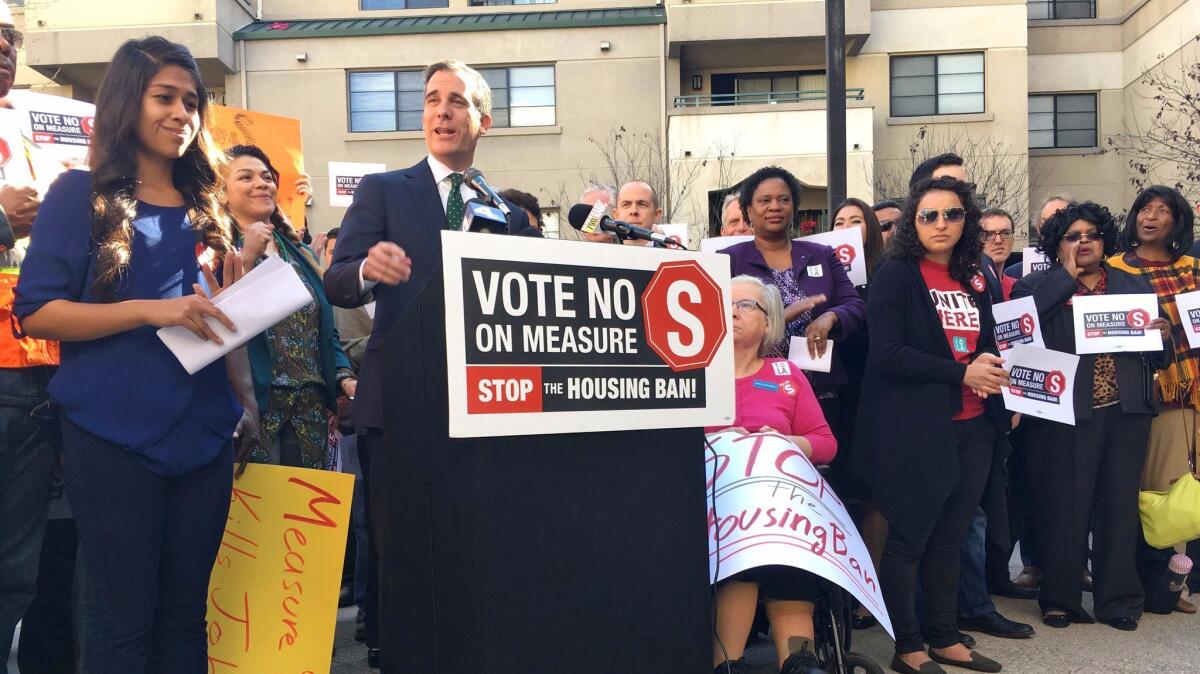L.A. Mayor Eric Garcetti has yet to ban private meetings with developers

- Share via
Los Angeles Mayor Eric Garcetti said in September that he would stop planning commissioners from meeting privately with real estate developers or other outside parties.
Banning such meetings would “ensure that all dialogue with private stakeholders is on the record,” Garcetti wrote.
That pledge was part of an unsuccessful bid to dissuade AIDS Healthcare Foundation executive Michael Weinstein from pursuing Measure S, a controversial ballot measure that would restrict real estate development in Los Angeles. Garcetti argued that L.A. already was pursuing reforms to make the process of approving new homes, offices and shops more transparent.
But with the March election a week away, Garcetti has yet to issue an executive directive to prohibit such meetings.
The mayor says he is still planning to do so, but the process “involves a great deal of research, legal consultation and input from a range of stakeholders,” spokesman George Kivork said. Garcetti said his office has been finishing up a legal analysis of the idea and will release the executive directive soon.
However, “we didn’t want to inject it in the midst of a political campaign,” Garcetti said Monday.
Backers of the ballot measure, which goes before voters Tuesday, argue that it is an example of how L.A. leaders have failed to deliver on their promises for reform. “It was a ploy,” said Jill Stewart, campaign director for Yes on S. “It got him some good press … and he hasn’t done a damn thing.”
Opponents of the ballot measure argue that the entire issue is a red herring, pointing out that Measure S does not ban private meetings between planning commissioners and developers. Nor does it prevent developers from giving campaign donations to city officials, another phenomenon that has raised concerns about their influence.
Measure S “is silent on campaign finance reform and ex parte meetings and instead will eliminate jobs, raise rents and increase homelessness,” said Josh Kamensky, a spokesman for the opposition campaign.
The Yes on S campaign contends that the measure would combat City Hall corruption in other ways.
For instance, Measure S would bar city leaders from altering the General Plan — a document that governs development across the city — so that developers can build individual projects in areas where they would otherwise be prohibited. The campaign has argued that politicians have agreed to such “spot zoning” as a favor to politically connected developers.
“If I’m a City Council member and I can no longer hand out a favor, I’m not going to be getting nearly as much money from developers,” Stewart said.
The ballot measure also would impose a moratorium on building projects that require zone changes and other alterations in city rules. Measure S supporters argue that it would prevent out-of-scale development that ramps up traffic and displaces longtime residents. Opponents counter that it would eliminate jobs and exacerbate the housing crisis by increasing rents.
Garcetti opposes the ballot measure and has publicly tangled with the Yes on S campaign. When backers of Measure S used his image on a campaign email, Garcetti accused them of a “dirty trick” that misled voters to think he supported the measure. He demanded that they avoid any suggestion that he favored Measure S.
The Yes on S campaign countered that it was merely showing that Garcetti agreed with some of the proposed reforms. It recently sent out mailers saying, “Mayor Garcetti Finds a Lot to Like About Measure S,” which bore a large photo of Garcetti grinning next to the words, “I agree.”
The mailer repeatedly quoted his September letter to Weinstein — the same letter in which he urged Weinstein not to pursue the ballot measure.
Garcetti cited that campaign mailer when explaining why he wanted to hold off on banning private meetings with planning commissioners until the election was over, saying his words had been twisted during the campaign. The mayor and his staffers also said it took time to craft an executive directive in a thoughtful way.
Stewart dismissed that argument, saying, “He could have done it the very next day.”
This isn’t the first time that L.A. politicians have suggested restricting private meetings and other ex parte communications that happen outside of public hearings — such as telephone calls, emails and letters. Ten years ago, then-City Councilwoman Wendy Greuel proposed regulating private meetings and other communications between city commissioners and people with business before them, saying they “could potentially be seen as a violation of ethical standards.”
Rocky Delgadillo, the city attorney at the time, recommended that the city prohibit ex parte communications in some situations: those where a decision-maker is required to hold a hearing and reach a decision based on the facts presented at that hearing. That could include some land-use matters, Delgadillo wrote.
Greuel proposed turning those recommendations into law, but the plan never went to a vote. Councilman David Ryu revived the idea last year, arguing that private meetings on real estate developments had become a “lightning rod” for public criticism.
“There is a glaring structural problem in our work when developers can contact commissioners outside of commission meetings and make their case in private,” Ryu wrote.
His proposal has yet to be heard in committee.
Twitter: @LATimesEmily
More to Read
Sign up for Essential California
The most important California stories and recommendations in your inbox every morning.
You may occasionally receive promotional content from the Los Angeles Times.











